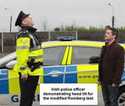 In recent cases, such as 2016’s Utah v. Strieff, the United States Supreme Court has substantially diluted the reasonable suspicion rule. This dilution makes it easier for officers to pull over motorists on suspicion of DWI.
In recent cases, such as 2016’s Utah v. Strieff, the United States Supreme Court has substantially diluted the reasonable suspicion rule. This dilution makes it easier for officers to pull over motorists on suspicion of DWI.
However, the underlying rule, which is that officers must have specific, articulable facts that point to criminal activity, remains in effect. This rule comes from 1968’s Terry v. Ohio. Officers may use their training or experience to interpret the facts they see, but there must be some facts.
A DWI stop is like the cornerstone of a house of cards. If a Weatherford criminal defense attorney pulls out that card, the entire case collapses. So, reasonable suspicion, or lack thereof, is one of the most important issues in DWI defenses.
The Reasonable Suspicion Environment
Especially around certain holidays, many police departments carry out STEP campaigns. Selective Traffic Enforcement Programs vary by jurisdiction, but generally, supervisors redirect officers to a certain place and instruct them to cite motorists for DWI, speeding, or another targeted infraction.
As a result, some officers who normally have desk assignments go out on patrol. These officers may not have the same level of training or experience as patrol officers. Additionally, supervisors often pressure these officers to issue as many citations as possible, in order to justify the program’s expense. As a result, officers sometimes take illegal shortcuts.
Facts Which Constitute Reasonable Suspicion
Many times, the observed facts have nothing to do with DWI. If officers observe any offense, they may detain the motorist. That includes some very obscure and hyper-technical driving rules, such as failure to stop when exiting a private driveway or a partially-obscured license plate.
Other officers pull over motorists based on third-party tips. Courts use a totality-of-the-circumstances analysis to judge the validity of these tips. Some factors include:
-
Source: Anonymous tips are almost inherently unreliable, since the tipster did not even vouch for the information. Officer tips are almost inherently reliable, because it is easy to verify their accuracy. Everything else, such as cell phone tips from fellow drivers, are somewhere in the middle.
-
Time: Most tips have very short shelf lives. If the tip is more than a few minutes old, it is probably stale and unreliable.
-
Specificity: The more specific the information, the more reliable the tip. If the officer had to fill in some blanks (e.g. “I think a driver of a black Toyota Camry is drunk), the tip is probably unreliable.
Tips stand or fall on their own. Prosecutors cannot work backwards. They cannot argue that since the information was accurate, the tip must have been reliable.
Officers must have reasonable suspicion before they initiate DWI stops. For a free consultation with an experienced criminal defense attorney in Weatherford, contact Herreth Law. After hours visits are available.

